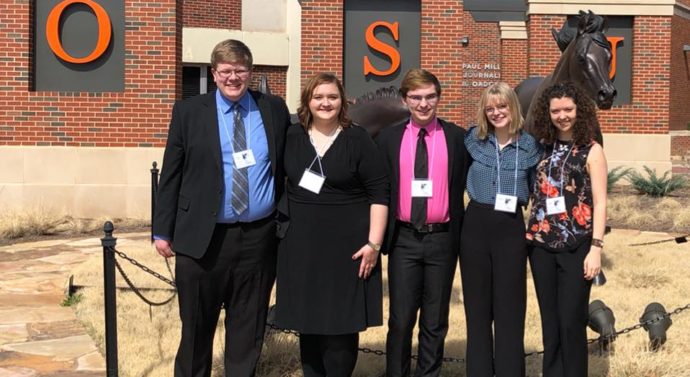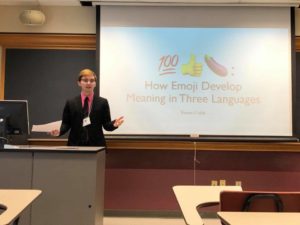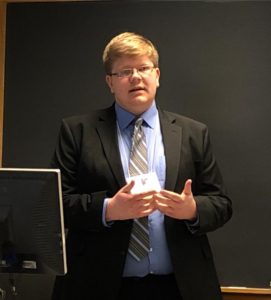
Drury honors students present research at academic conference
Campus News, News April 6, 2018, Comments Off 173From March 23 to March 25, several students from the Drury Honors Program traveled to Oklahoma State University in Stillwater, Oklahoma to present their research findings. Meagan Carmack, Trevor Cobb, Mackenzie Cox, Jacob Hubers and Natalie Maxson have been working hard on their research projects throughout the semester.

Trevor Cobb presents the meaning of emoji.
Cobb’s project was his Honors senior thesis, entitled “100, Thumbs Up, Eggplant: How Emoji Develop Meaning in Three Languages,” which studies emoji meaning across different cultures. After discussing emoji habits with several international students, Cobb learned many strange and surprising quirks about their usage within different cultural contexts.
Cobb synthesized all of his information from research and interviews into a concise ten-minute presentation to touch on the major themes of the project. He said that some of his more interesting findings emerged when emoji types were analyzed by language.
“I found that French speakers statistically use heart emoji four times more than average speakers of other languages,” said Cobb. “Additionally, Arabic speakers use four times more plant emoji (flowers, trees, leaves, etc.).”
But Cobb wasn’t the only student with interesting findings.
Hubers’ project, entitled “Law and Crime within The Bluest Eye: A Quantitative Approach to a Qualitative Field,” analyzed the use of crime and criminal activity in Toni Morrison’s novel “The Bluest Eye.” His main goal with this project was to allow for a more holistic approach to understanding the novel.
Morrison was a single mother teaching at Howard University when she authored the work at hand. “The Bluest Eye” is set in 1941 and centers around the life of a young African-American girl named Pecola, who grows up during the years following the Great Depression. The social stigma surrounding her race causes her to develop an inferiority complex, which fuels her desire for the titular blue eyes that she equates with “whiteness.”
Due to many controversial topics in the book including racism, incest and child molestation, there have been numerous attempts to ban the book from schools and libraries.
Throughout his research, Hubers said he found more than 70 active crime references which highlighted more than a dozen legal subtypes. Additionally, his data shows that African American women and children (such as the aforementioned protagonist) are the leading victim demographic.

Jacob Hubers speaking at the conference.
Hubers noted that while thematic elements of Morrison’s novels have been widely investigated, “there remains a startling lack of scholarly analysis regarding the issues of crime and law enforcement within her works.”
This was Hubers’ second conference this year, and he was glad to get another perspective on how they are run. He said he hopes to have his project ready for publication this fall, and was especially grateful for the opportunity to get additional feedback through this process.
Cobb recommends that all students, not just those in the Honors Program, attend and present at a conference if they are given the chance.
“It is a great preparation for any student planning to go to grad school, and a nice boost of confidence when you see how prepared you are for something like this,” said Cobb.
Cobb also enjoyed the opportunity to get to know some of his fellow Drury students.
His biggest takeaway was that “it really puts into perspective how amazing students at this campus are.”
Article written by Mason Coble.